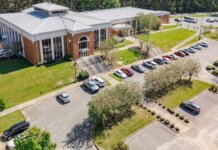
Building a new school is amazingly complex. Safety considerations are critical. Accommodating technology is essential. Flexible classroom space must allow for modern teaching styles.
Companies that design and build new schools in Alabama no longer use cookie-cutter designs that worked for generations.
Gary L. Owen Jr. is regional vice president and Birmingham office leader for Goodwyn Mills Cawood architecture and engineering company. GMC is the architect of record for a new Gulf Shores High School expected to cost more than $133 million.
The firm recently completed design of a roughly 100,000-square-foot addition to Homewood High School, which Owen’s own children attended. The expansion includes a fine arts program with areas for band, dance and theater; space for sports training and workouts; plus offices and classrooms.
At Little Ridge Intermediate School, at the base of a mountain in Fort Payne, GMC reflected the school’s STEM emphasis, Owen explains, with a solar system, periodic table and musical notes incorporated in the design.
“Everywhere in the building were these hints of things kids could learn as they moved through parts of the building,” Owen says.
Just like modern office spaces, new schools accommodate multiple uses. The traditional rigid design of multiple classrooms and hallways has evolved.
“That model has really changed to where they have more collaborative-type learning spaces, where multiple disciplines can use the same spaces,” he says.
Those flexible spaces accommodate small breakout study areas or gatherings of larger groups.
Another feature of the modern school building is “the ability for people to learn all over the school,” Owen says.
Teachers do presentations in common areas, he says, and “cafeterias are now learning spaces for kids to study.
“Media centers have totally changed,” he adds. “They’re much less about stacks of books and more about digital learning.”
Builder’s viewpoint
Doster Construction, of Birmingham, was the general contractor on the $99.9 million Benjamin Russell High School in Alexander City and is a veteran of many school construction projects in Alabama. The company completed Austin High School in Decatur in 2018 and breaks ground on a new Moody High School this year.
“It is the technology in the schools that has changed the most,” says Doster Operations Manager Jim Davis. “Additionally, the finishes have kept up with the changing times.”
Because this is storm-prone Alabama, “tornado shelters are designed for all new schools, under strict requirements and supervision of state inspectors,” Davis says.
Book lockers are disappearing, too. It’s all about wireless technology.
“It relates to the way kids are learning,” says GMC’s Owen. “They can have a Chromebook, a Macbook, phone or laptop literally in any space in that school and be able to study or receive material and interact with their peers or their teachers.”
These modern, flexible spaces better prepare students for college or careers, Owen observes.
“The real world is more collaborative. You work together in teams.”
Davis says schools can be great projects for general contractors, though complex because design must accommodate programming.
Aesthetics are still important. At Benjamin Russell High School, “the cafeteria is designed to look like a lake lodge,” Davis says.
Auditoriums bring their own design challenges.

“Most people do not realize when they go watch their children perform in their school’s auditorium that that is one of the most complex structures you can build,” Davis says. “Sloped floors for the seating are not conducive to operating conventional construction lifts.”
Stages are intricate, too, with curtains, rigging, lighting, acoustic considerations and more.
At Russell High, “the stage rigging system in the auditorium is comparable to any high-end production theater,” Davis says.
Schools today also must accommodate teaching aids like 3-D printers, STEAM labs, robotic training, broadcast studios, film equipment and green screens.
In the Gulf Shores school, Owen says, “we have a classroom and a lab that is set up to bring in large aquariums and holding tanks. They do research on oyster beds and oyster reproduction.”
Safety, naturally, is one of the biggest issues in constructing today’s schools.
One focus is “hard, structural-type practices like secure vestibules, access control that deals with hardware, limited access with doors so all the administrators and staff use certain doors to get into the building,” Owen says.

When the morning bell rings, all visitors must come to one entry point.
“You basically have a secure perimeter where no doors are able to be opened from the exterior, except from a vestibule,” he explains. From there visitors are cleared, obtain credentials and walk in with an escort.
“A lot of this is controlled through technology and electronic devices, which 10 or 15 years ago it was unheard of,” says Owen.
Almost every school GMC has worked on in the last five years has such technology, he says.
Though no national guidelines regulate school safety measures, GMC invites interested parties to participate during planning for this crucial need.
“We have the local police, local fire department and emergency management agency representatives at the table,” he says. “We talk through the philosophy of the school, the access to the school from a site standpoint, vehicular access – they always want to know where’s my firetruck access – how do I get to the school in the event there’s an active shooter?
“They come up with all kinds of scenarios you don’t even think about,” Owen says.
Company-wide, GMC has 24 offices in seven states and more than 500 employees with “about six schools going on all the time.”
Despite the challenges of designing school buildings in the 21st century, the work is fulfilling, says Owen, who has dedicated his career to it. He went to Homewood High and one of his children was attending during the renovations.
“It’s very, very rewarding to do a new school, especially in some areas where they may build only one or two schools in 20 years,” he says. A new school brings the community together.
The Gulf Shores school was a legacy project that would be “the only high school they would build in most of our lifetimes.”
Davis says Doster takes great pride in building new schools, too.
“Everyone on the team would be proud to send their children to the schools we are building,” he says.
Deborah Storey is a Huntsville-based freelance contributor to Business Alabama.
This article appears in the February 2024 issue of Business Alabama.



